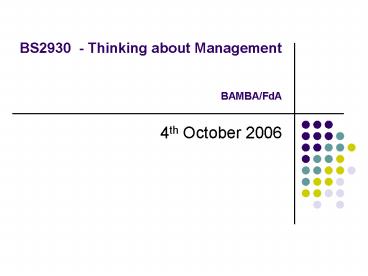BS2930 Thinking about Management BAMBAFdA - PowerPoint PPT Presentation
1 / 20
Title:
BS2930 Thinking about Management BAMBAFdA
Description:
Induction Saturday 7th October. What makes a good manager? Modern ... Recent thinking on leadership skills for crisis management (Daft, 2006) Stay calm ... – PowerPoint PPT presentation
Number of Views:34
Avg rating:3.0/5.0
Title: BS2930 Thinking about Management BAMBAFdA
1
BS2930 - Thinking about ManagementBAMBA/FdA
- 4th October 2006
2
Outline
- Course representative
- Induction Saturday 7th October
- What makes a good manager?
- Modern management styles
- Assignment 1
- Skills diagnostic test
3
What makes a good manager?
- For next week
- Write a document (1 page A4 max) with that title.
- Be as creative as you want (text, diagram,
image) - Bring a printed page to the class
4
The Role of managers
- Traditionally
- Planning, organising, leading and controlling
- someone who is responsible for the operation
of a discrete organisational unit or function and
who has been give authority over those working in
that unit or function. - (Watson Gallagher, 2005)
5
Modern Managers
- Leader teams/virtual/cultural
- Personal influence position/self/expertise
- Resources people/assets/
- Ambiguity
- Adaptable
- Communicator listen/talk
- Creative
6
Recent thinking on leadership skills for crisis
management (Daft, 2006)
- Stay calm
- Be visible
- Put people before business
- Tell the truth
- Know when to get back to business
7
Learning Organisation
- where everyone is engaged in identifying
solving problems change and continuously improve
Team based structure
Open Information
Empowered employees
8
Classical Management Styles
- Bureaucracy (Weber)
- Human Relations (Hawthorne Studies Mayo)
- Needs based Maslow
- Theory X Theory Y McGregor
- X dislike of work
- Y work is as natural as rest or play
- TQM
- Psychological Contract - Guest
9
A model of the Psychological Contract Prof David
Guest
Attitudinal Consequences Organisational
Commitment Job Satisfaction Employment
relations Security
Causes
Content
Involvement Climate Organisational Climate HR
Practices Experience Expectations Alternatives
Fairness Trust The delivery of the deal
Behavioural Consequences Motivation Effort Attend
ance/absence Organizational citizenship Intention
to stay/quit
10
For next week
- Read up about different management approaches
(use texts from reading lists) - Decide subject for your research proposal
- Any items not actioned from week 1
11
Assignment 1
- Your research proposal
- Present on 1st November
- Submit on 8th November
12
What is a research proposal?
- Plan
- Timetable
- Define your field of interest
- What is (are) your aim(s)?
- Proposed phases of the work
- Dates
- Current knowledge (literature review)
- How you intend to add to that knowledge
- Methodology for research
13
How will it look?
- Title
- Aim
- What is known
- Plan of work
- Phase 1, 2, 3 and timelines
- Methods
- References/Bibliography
14
Title
- Some examples
- The popularity of the learning organisation
- An investigation into the HR issues that
managers may face with the emergence of the
knowledge worker. - Organisational design and the implementation of
office information systems
15
Aim (some examples)
- To prove if the learning organisation is a
popular myth or if organisations are implementing
the rhetoric - To add to the body of knowledge on how to
successfully keep valuable knowledge workers
engaged in the activities and success of
organizations. - To identify the effects of different organisation
design strategies on the implementation and
successful exploitation of office systems.
16
What is known
- Aims to inform the reader of the state of
knowledge concerning a particular topic area as
represented by recognised scholars and
researchers. - Literature review
- E.g., The exploitation of office information
systems is much less than anticipated in the
early 1980s, in part because senior management is
unsure of the strategic benefits of office
automation, where to start or how to manage the
change process (Price Waterhouse, 1988/89).
Research on the organisational effects of office
automation has focused on attitudes (Wainwright
Francis, 1984). Less is known about
organisational structure and performance (Olson
Lucas, 1992). The research will focus on the
managerial issues involved in the successful
introduction of new technology, which seem to
depend on organisational factors and the quality
of the implementation process (Marcus Robey,
1983).
17
Plan of work
- Importance of time management
- Little and often
- Big projects need breaking
- down
- Manageable parts
- Timelines
- Am I on target?
18
Research Methods
- Approaches
- Quantitative
- Qualitative
- Mixture of both
- E.g., survey, semi-structured interviews,
assessment of documents such as training manuals
19
References
- Harvard referencing system
- What is the difference between reference and
bibliography? - Plagiarism
20
Key to success
- Success in life generally, comes from doing
simple things consistently. But because it is
simple does not mean it is easy to do. - Eric Parsloes Law of Simplicity































